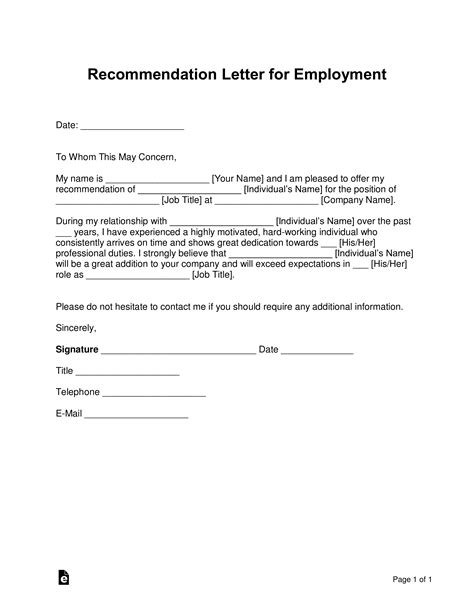Employer Recommendation Sample: Tips And Guidelines

When it comes to job hunting, a recommendation from a previous employer can be a valuable asset. It can provide potential employers with insight into your work ethic, attitude, and skills. Moreover, a recommendation can set you apart from other candidates and increase your chances of being hired. In this post, we will discuss the dos and don’ts of employer recommendations and provide you with tips on how to ask for and receive a strong recommendation.
Do’s of Employer Recommendations
1. Choose the right person
The first step in obtaining a strong employer recommendation is to choose the right person. Select someone who has worked with you closely, preferably a supervisor or manager who can provide detailed information about your work performance, skills, and achievements.
2. Ask politely
When asking for a recommendation, be polite and respectful. Give your previous employer enough time to write a thoughtful and detailed letter. Make sure to provide them with all the necessary information about the job you are applying for, including the job description, your resume, and any relevant experience.
3. Provide examples
When requesting a recommendation, provide examples of your accomplishments and specific projects you worked on. This information can help the employer write a more detailed and effective letter.
4. Follow up
After you have asked for a recommendation, make sure to follow up with your previous employer. Send them a thank-you note and keep them updated on your job search process.
Don’ts of Employer Recommendations
1. Ask a stranger
Do not ask someone who does not know you well, such as a co-worker or a friend. This can result in a generic and unhelpful letter.
2. Pressure the employer
Do not pressure your previous employer into writing a recommendation. This can lead to a negative or unenthusiastic letter.
3. Provide false information
Do not provide false information or exaggerate your accomplishments. This can damage your reputation and lead to negative consequences.
4. Forget to say thank you
Do not forget to say thank you to your previous employer after they have written a recommendation. Gratitude can go a long way in maintaining a positive relationship.
Tips for Writing a Strong Employer Recommendation
1. Be specific
Provide specific examples of the employee’s skills, achievements, and work performance. Use concrete language and avoid vague or general statements.
2. Be honest
Provide an honest assessment of the employee’s strengths and weaknesses. Avoid exaggerating or sugarcoating their performance.
3. Be concise
Keep the letter concise and to the point. Avoid unnecessary details or information that is not relevant to the job the employee is applying for.
4. Use a professional tone
Use a professional and formal tone throughout the letter. Avoid using slang or informal language.
FAQs
1. How do I ask for a recommendation from a previous employer?
You can ask for a recommendation by sending an email or scheduling a meeting with your previous employer. Make sure to provide them with all the necessary information about the job you are applying for and give them enough time to write a thoughtful letter.
2. Can I write my own recommendation letter?
It is not recommended to write your own recommendation letter. This can be seen as unprofessional and can damage your reputation.
3. How many recommendation letters should I provide?
It is recommended to provide 2-3 recommendation letters from previous employers or supervisors.
4. Can I ask for a recommendation from a previous employer who fired me?
You can ask for a recommendation from a previous employer who fired you, but it is not guaranteed that they will provide a positive letter.
5. How long should a recommendation letter be?
A recommendation letter should be one page or less. It should be concise and to the point.
Conclusion
An employer recommendation can be a valuable asset in your job search process. By following the do’s and don’ts of recommendation letters and providing your previous employer with specific examples of your work performance, you can increase your chances of receiving a strong and effective letter. Remember to be polite, honest, and professional throughout the process and express gratitude for their time and effort.
